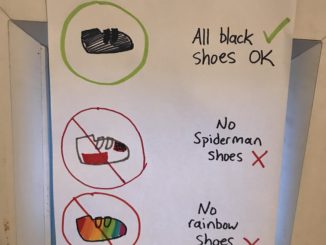Hey! This post is going to be about Jesus, and child development, and the kind of Christianity I grew up in, that I’ve moved away from, and where I see myself now. I recognize that there is a lot of hurt and tenderness in this topic for many people, as well as you maybe just not being interested in a more personal, reflective post. Feel free to scroll by if this isn’t right for you.
I know it’s almost a cliche at this point to make fun of the Christmas songs that talk about baby Jesus with absolutely no acknowledgment of the reality of, like, human babies.
Silent Night says newborn Jesus doesn’t cry. Do You Hear What I Hear? talks about him shivering in the cold and then…bringing him gold, for some reason (presumably rhyming is the reason). The Little Drummer Boy comes and plays a drum at a newborn (talk about sensory overload!), who then smiles at him…which I’d wager means that he had gas, as newborn babies can smile instinctually in relief, but don’t consciously smile as a social gesture until 3-6 weeks of age. The whole story is cloaked in an air of mythos that tends to happen when things get reduced to children’s folktales and set to music.
I do believe in a literal Jesus, as a person who existed. I believe in him as God, but I’m not here to list the tenets of my theology, only to talk about the way that they’ve affected me and my journey to become this person here on this page, the one that you know, The Occuplaytional Therapist.
Because I can also remember being very young and asking someone if my faith — the one I was raised in — believed that babies sin, like, immediately. I was baffled by the mental gymnastics it takes to justify the theologies of hell and damnation, and like, *a baby* seemed like a pretty valid counterpoint. And the adult I was asking this question to told me that when babies are born, they immediately cry, and that crying is selfish and therefore an instant sin.
So: “little Lord Jesus, no crying he makes.” Because he’s sinless and selfless, so he can’t do that. That’s the logical outworking of that belief.
I was a precocious kid and a voracious reader. Any of the books about stereotypical fundamental/evangelical child-raising and punishment that you’ve heard of? I probably read them when I, myself, was 10 years old or younger. I read about how to choose an instrument to hit your child with and how many times to hit them with it. How to set up “tests” for your child to break them of their “defiance”. Like, for example, putting something that a baby — an 11 month old — wants, within their reach (like sunglasses), and then hitting them every time they reach for it until they learn to “submit” to you and give up. I read verses from my own beloved Bible, cherry-picked and lined up and stripped of context, about how continuously evil and wicked and depraved little children are. I read all of this sort of thing when I was like nine.
The beliefs laid by this kind of foundation were deeply rooted through so many areas of my heart and soul, and they only started to fall apart for me a few years ago. Again I must say — the theological study of unraveling all of these things took me 5+ years and continues every day, and cannot be contained in a single, vulnerable post. So if you’re heading to the comments to quote a verse at me and ask me to refute it, I’m not going to do that. Maybe some day I will make another post with points for further study if you’re somewhere on this journey, too, and you in good faith want to follow where I’m walking. This isn’t the time and place for that, and this is a really hard emotional topic for me, so I don’t have the ability to do that for you right this minute. The resources are out there. I encourage you to find them, if you need them. Not as a “gotcha” to try to prove me wrong. If you need that, you’re going to have to go somewhere else.
But I just can’t let Christmas pass by without acknowledging my own belief in a baby Jesus who cried because I know an adult Jesus who cried. He was born, human, in blood and tears and poop. He was a toddler who reached for things that adults around him didn’t want him to reach for, and put things in his mouth that someone had to take away. He had to learn the frustration of communicating confined to spoken language, word by word, and cried when he couldn’t make himself understood. He was a preteen boy who forgot to tell his parents his plans and, when questioned about it, answered them as someone on equal footing with them — in a way that many parents today would call “talking back” or “disrespectful”, because he dared to speak as though he were equal to an adult. And on top of behavioral thoughts — he was a refugee, his family fled across borders and sheltered him, he was scorned for being a bastard, he lived among the poor if not in poverty, he came from trauma and hard places.
And I cannot, in good faith, believe in a Jesus who has enough grace — boundless grace — for adults who struggle and fall short of their best, but expects those same adults to hurt their children instead of showing them the same grace.
Jesus was a child, so there is clearly nothing inherently wrong with being a child. It took him time to grow up and he sometimes annoyed and frustrated the people around him while he was doing it. He took the long, hard, messy road to adulthood and maturity that all of us have taken. And he held that time so dearly, and loved children so well, that he repeatedly told adults that they needed more childishness in order to be able to receive him.




